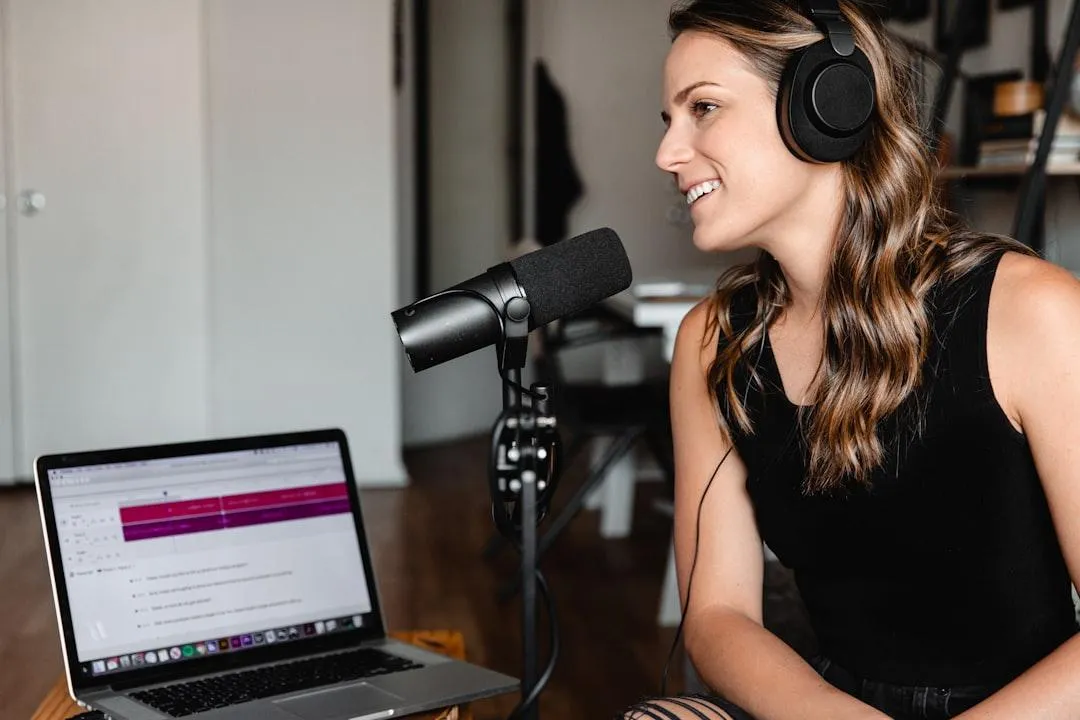
Should You Jump In? The No-Nonsense Guide to Starting A Podcast For Your Business
So, you’ve heard the buzz. Maybe your competitors are launching shiny new shows or your marketing buddy won’t stop raving about that one podcast that “changed their whole funnel.” You’re sitting there wondering: Is starting a podcast for your business worth the hype, or will it just eat up your time faster than you can say “recording session”? Let’s cut through the noise and get real about what podcasting can actually do for your business—and when it might just be a colossal waste of energy.
The Allure: Why Businesses Are Flocking To Podcasting
Let’s face it, podcasts are everywhere. From the local dog groomer to Fortune 500 execs, it seems like everyone’s got a mic and a message. But why? Here’s what’s fueling the frenzy:
Low barrier to entry: You don’t need a Hollywood studio. A decent mic, basic editing software, and a quiet room will do.
Intimacy with your audience: There’s something about having your voice in someone’s ear during their commute or gym session that builds trust.
Content repurposing: One podcast episode can fuel blog posts, social clips, emails, and more.
SEO and discoverability: Podcasts can boost your search engine presence—especially if you transcribe episodes or publish show notes.
Thought leadership: Hosting guests and sharing insights positions you as an expert.
But before you rush out to buy a fancy microphone, let’s pump the brakes and peek behind the curtain.
The Big Question: Is Starting A Podcast For Your Business the Right Move?
Not every business should start a podcast. Gasp! Yes, you heard that right. Sometimes, it’s a brilliant move; other times, it’s a time-sucking treadmill to nowhere.
Here’s what you’ve got to ask yourself:
1. Who’s your audience?
Are your ideal customers even listening to podcasts? If they’re not, your efforts may fall on deaf ears—literally.
2. What’s your goal?
Are you chasing brand awareness, lead generation, community building, or just following the crowd? If you can’t pin down a goal, you’ll spin your wheels.
3. Do you have the resources?
Podcasting is simple to start but time-consuming to maintain. Can you commit to regular episodes, editing, and promotion?
If you’re nodding along, podcasting might be your next power move. If not, it could be a distraction from channels that actually move the needle for your business.
The Pros: Reasons Starting A Podcast For Your Business Rocks
Let’s talk benefits. Here’s why podcasting can be a game changer:
- Humanizes your brand: Your voice, quirks, and stories make you real. People buy from people, not faceless logos.
- Expands your reach: Podcasts can be distributed across platforms—Apple, Spotify, Google—putting your business in front of new ears weekly.
- Builds authority: Interviewing experts, sharing case studies, and discussing industry trends can cement your status as a go-to resource.
- Strengthens relationships: Inviting clients, partners, or industry leaders onto your show deepens connections and opens doors.
- Loyal audience: Podcasts create “super fans” who tune in week after week—making them far more engaged than casual blog readers or social scrollers.
- Content flywheel: Each episode is a goldmine for repurposing—think audiograms, quote graphics, and newsletter content.
- Affordable marketing: Compared to paid ads or video production, podcasting can be cost-effective, even with some outsourced editing.
The Cons: When Starting A Podcast For Your Business Is a Dud
Of course, it’s not all sunshine and sponsorships. Let’s get real about the drawbacks:
- It’s a slow burn: Building an audience takes time—sometimes months or years. Don’t expect overnight success.
- Time commitment: From planning and recording to editing and promoting, podcasts eat up hours. Miss an episode? Your audience notices.
- Production hurdles: Bad audio quality, inconsistent scheduling, and lackluster topics can turn people off fast.
- ROI can be fuzzy: Unless you’ve got a clear strategy, tracking leads or sales from a podcast is tricky.
- Competition is fierce: There are millions of podcasts out there. Standing out means bringing something unique to the table.
- Not for every industry: If your clients aren’t listening to podcasts or your topic isn’t suited for audio, you might be shouting into the void.
- Burnout is real: Many shows “podfade” after a few episodes. If you’re not passionate or organized, it’s easy to give up.
Weighing the Pros and Cons: Is Podcasting for You?
Let’s break this down with a quick pro/con chart:
Pros: Builds brand authority, Deepens customer relationships, Cost-effective content, Repurposing potential, Humanizes your business, Networking opportunities.
Cons: Time-consuming, Slow audience growth, Hard to measure ROI, Technical/production challenges, Not suitable for all industries, Risk of burnout.
If your “pros” column is lighting up, keep reading. If “cons” have you sweating, maybe hold off or test the waters with guest spots first.
Who Should (and Shouldn’t) Start A Podcast For Their Business?
Great Candidates for Podcasting:
Service-based businesses: Coaches, consultants, agencies, and thought leaders—podcasting is your jam.
Brands with stories: If you’ve got fascinating case studies, customer journeys, or industry secrets, listeners will tune in.
B2B companies: Podcasts can be a killer way to connect with decision-makers and establish trust in niches with longer sales cycles.
Niche communities: If your industry or hobby has passionate followers, a podcast can rally them around your brand.
Maybe Hold Off If:
Your audience prefers visuals or text (think: design-heavy, product-based, or B2C brands with minimal storytelling angles).
You lack time, resources, or the desire to commit.
You’re just jumping on the bandwagon without a clear strategy.
The Nitty-Gritty: What Does It Really Take to Succeed?
Alright, so you’re leaning in. What separates the flash-in-the-pan shows from the podcasts that actually move the needle?
1. Consistent, quality content:
Release on a regular schedule and keep your standards high. No one wants to hear muffled audio or rambling monologues.
2. Clear value proposition:
Why should someone tune in? What will they learn, or how will they be entertained?
3. Promotion, promotion, promotion:
Don’t just hit “publish” and pray. Share episodes across your email list, social media, website, and industry groups.
4. Listener engagement:
Respond to feedback, invite questions, and shout out your fans. Build a community, not just an audience.
5. Smart guest strategy:
Interviewing industry leaders or clients can boost authority and expand your reach (and network).
6. Repurpose content:
Turn episodes into blogs, social posts, videos, or even webinars. Squeeze every drop out of that effort.
Starting A Podcast For Your Business: Step-by-Step Game Plan
Ready to give it a shot? Here’s a no-fluff roadmap:
1. Define your audience and goals:
Who are you talking to? What do you want them to do (or feel) after each episode?
2. Choose your format and style:
Interview, solo, roundtable, narrative? Pick what aligns with your brand and feels doable.
3. Plan your first 10 episodes:
Brainstorm topics, potential guests, and key talking points. Avoid winging it.
4. Get the right gear:
You don’t need a studio, but invest in a decent USB mic (like the Audio-Technica ATR2100x or Samson Q2U). Use free tools like Audacity or paid options like Adobe Audition for editing.
5. Record and edit:
Find a quiet space. Edit out awkward pauses, background noise, and “ums.” Don’t overthink perfection.
6. Publish and distribute:
Use podcast hosts like Libsyn, Podbean, or Anchor to push your show to Apple, Spotify, and more.
7. Promote relentlessly:
Tease episodes on social, send to your list, ask guests to share, and engage your audience for feedback.
8. Measure and iterate:
Track downloads, listener feedback, and business impact. Adjust your topics or style based on what clicks.
FAQs: Starting A Podcast For Your Business
Q: How much does it cost to start a business podcast?
A: You can get started for under $200 with a solid mic and free editing software. Outsourcing editing or design will add to your budget, but DIY is totally viable.
Q: How often should I release episodes?
A: Weekly is common, but consistency trumps frequency. If monthly is all you can handle, stick to it—just set expectations.
Q: What if I have no audience yet?
A: Everyone starts from zero! Leverage your existing customers, social media, and guests’ audiences to grow. Promote episodes everywhere you can.
Q: Do podcasts really help generate leads?
A: Yes—if you offer value, plug your services subtly, and encourage action. Many businesses use podcasts to warm up leads, nurture relationships, and shorten sales cycles.
Q: Isn’t the market too saturated?
A: Sure, there are a lot of podcasts. But most don’t last beyond a few episodes. If you’re committed, consistent, and offer something unique, there’s room for you.
Q: How do I measure success?
A: Track downloads, listener engagement (reviews, emails, DMs), and—most importantly—business results like leads or sales attributed to your show.
Conclusion: Should You Be Starting A Podcast For Your Business?
Let’s call a spade a spade: Starting a podcast for your business isn’t a magic bullet, and it’s definitely not for the faint of heart. It can humanize your brand, build authority, and create raving fans—if you have a clear strategy and the stamina to stick with it. But if you’re chasing quick wins or don’t have the bandwidth, it might just be a shiny distraction.
So, ask yourself: Will podcasting truly help you connect with your audience and reach your business goals? Got the grit to stay consistent and promote like crazy? If so, fire up that mic and start talking. If not, no shame—focus your energy where it’ll pay off.
At the end of the day, the best marketing channel is the one you’ll actually use. If that’s podcasting, go all in. If not, keep tuning in for other ideas. Either way, make sure your business voice is heard—one way or another.

